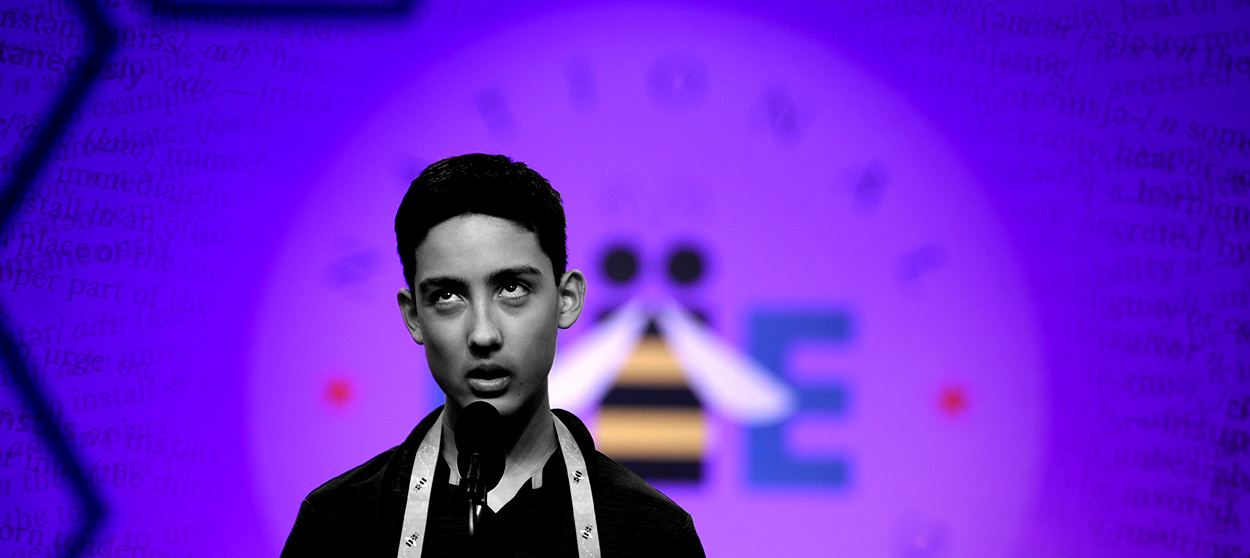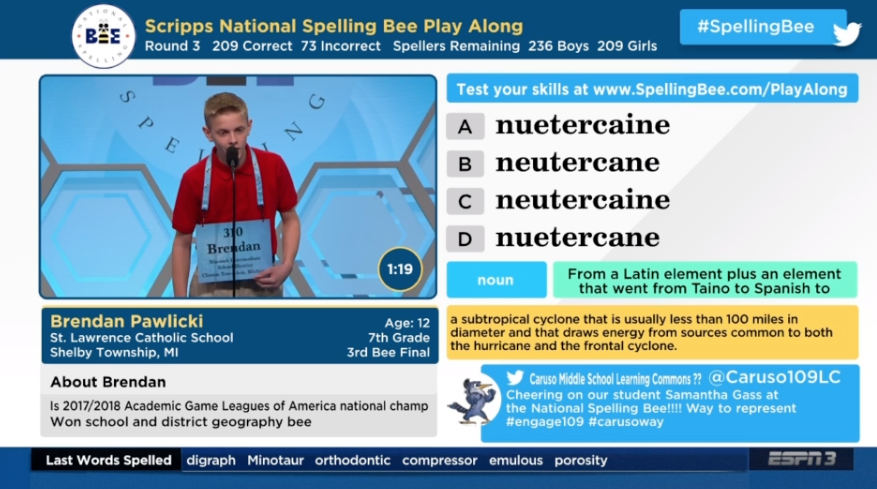The Scripps National Spelling Bee is a reminder of the English language's amazing enormity
There is almost no language on Earth that hasn't been somehow subsumed into English in some form or another


A free daily email with the biggest news stories of the day – and the best features from TheWeek.com
You are now subscribed
Your newsletter sign-up was successful
The word "ginkgo" is misspelled, even though you'll find it written that way in every English dictionary. Other accepted spellings include "gingko," with the 'G' before the 'K,' and "ginko," which — though rarely used outside the 1700s — was the spelling given in the third round of the Scripps National Spelling Bee by 11-year-old Charles Fennell on Tuesday. He advanced.
You see, back in 1712, when preparing a text about Japanese plants, the German naturalist Engelbert Kaempfer accidentally mis-transliterated the Japanese gin kyo (which itself comes from the Chinese yin-hing) as "ginkgo." But because Kaempfer was writing in Latin, his "ginkgo" error is identified by the Oxford English Dictionary as the word's official Latin etymon, although really the variations of ginkgo in English today are derived from a Latin misspelling of a Japanese translation of a Chinese word. Got all that?
There's no shame if you don't — the dizzying journey undertaken by "ginkgo" before arriving on the Scripps stage in its three accepted modern variations is a testament to the turbulent, hodgepodge, sticky-fingered and roughly-cobbled-together state of the English language, which contains more than 171,000 words in current use. And if you're like me, watching the spelling bee, which will air its final rounds on ESPN on Thursday and Friday, is humbling not just because of the kids who can spell "ginko", but because of the renewed admiration it inspires for a language I use every day yet will never fully grasp, no matter how many decades I commit to trying.
The Week
Escape your echo chamber. Get the facts behind the news, plus analysis from multiple perspectives.

Sign up for The Week's Free Newsletters
From our morning news briefing to a weekly Good News Newsletter, get the best of The Week delivered directly to your inbox.
From our morning news briefing to a weekly Good News Newsletter, get the best of The Week delivered directly to your inbox.
It is impossible to put a number on exactly how many words there are in English, although people certainly try. We do know English is likely one of the richest languages in the world due to its tendency to pillage other languages, like scooping up the Mexican Spanish "chihuahua" (the winning spelling bee word in 1967) or the Yiddish-by-way-of-Middle-High-German "knaidel" (the winning word in 2013). When Scripps contestants ask the judges, as is their right, about the origin of a word prior to taking a stab at the spelling, many times the answer is Latin or Greek, the roots that make up 60 percent of the English language. There is almost no language on Earth, though, that hasn't been somehow subsumed into English in some form or another.
Part of the appeal of watching the spelling bee is to be reminded of this sheer limitlessness, which even as a fluent speaker can be hard to fully appreciate. We only use a very small percentage of the words available in the dictionary in our day-to-day lives. The average speaker of English knows somewhere between 15,000 and 20,000 "lemmas," or brackets of related words ("spell," "spells," "spelled," and "spelling" are all one lemma, for example, as are "cold," "colder," and "coldest"). You can be conversational with 800 lemmas, but you need the most common 3,000 or so under your belt to appreciate a movie, and around 9,000 or so to read a novel, the BBC reports. It would take knowing a whopping 50,000 lemmas to understand 95 percent of the Oxford English Corpus, and there'd still be another 5 percent left over to leave you scratching your head.

The Spelling Bee isn't only about the words we rarely come across, though. Many of the winning words might surprise you with their relative popularity in everyday speech: The aforementioned "chihuahua" needs no definition here, while "romaine," "whimsical," "platypus," and "guacamole" — all words given in the Bee's third round — might on the surface seem deceptively simple. Only a look at each word's origins exposes their oddity together under the umbrella of "English": "romaine" being old French for "Roman"; "whimsical" traceable back to Scandinavian roots; "platypus" a smattering of letters taken from Modern Latin; and "guacamole" ending up in our vocabulary after originating in Aztecan. That any of us can spell these words, plucked as they were from across the globe and following no overlapping spelling rules, is impressive in and of itself.
And that's to say nothing of English's own ridiculous creations. In the third round of the Spelling Bee, one could also find "wafflestomper" — a sort of boot — and "Rooseveltian," a word that describes anything that pertains to the 26th or 32nd presidents of the United States. Likewise, a middle schooler from Colorado was confronted with "labradoodle," a word that specifies only dogs that are a cross between Labrador retrievers and poodles, while a boy from Illinois got "Michigander," a word specifying a person from Michigan. Meanwhile, a girl from Florida failed to properly spell "Chaplinesque," a word referring to anything that recalls the British actor and director Charlie Chaplin. Why we require the existence of words with such precise and specific definitions is a mystery left up to the arbiters of English dictionaries, which add new words every year. Case in point: Another third round word, locavore, describing "one who eats foods grown locally whenever possible," only started appearing in use in 2005.
A free daily email with the biggest news stories of the day – and the best features from TheWeek.com
Beyond studying for the SATs or GREs, though, there are few opportunities in life to really stop and appreciate the indefinable volume of words that are at our disposal as English speakers (to say nothing of those afforded to anyone who is bilingual). Even the most enthusiastic logophiles ultimately rely on the same 100 or so common lemmas for the bulk of their writing or speech.
The Scripps National Spelling Bee, on the other hand, is an annual chance to set aside arguments about the usefulness of knowing how to define and spell "smaragdine," and to marvel instead at the fact that if you need to describe something that is specifically emerald-like, then English has a word for you, too.
Jeva Lange was the executive editor at TheWeek.com. She formerly served as The Week's deputy editor and culture critic. She is also a contributor to Screen Slate, and her writing has appeared in The New York Daily News, The Awl, Vice, and Gothamist, among other publications. Jeva lives in New York City. Follow her on Twitter.
-
 The ‘ravenous’ demand for Cornish minerals
The ‘ravenous’ demand for Cornish mineralsUnder the Radar Growing need for critical minerals to power tech has intensified ‘appetite’ for lithium, which could be a ‘huge boon’ for local economy
-
 Why are election experts taking Trump’s midterm threats seriously?
Why are election experts taking Trump’s midterm threats seriously?IN THE SPOTLIGHT As the president muses about polling place deployments and a centralized electoral system aimed at one-party control, lawmakers are taking this administration at its word
-
 ‘Restaurateurs have become millionaires’
‘Restaurateurs have become millionaires’Instant Opinion Opinion, comment and editorials of the day
